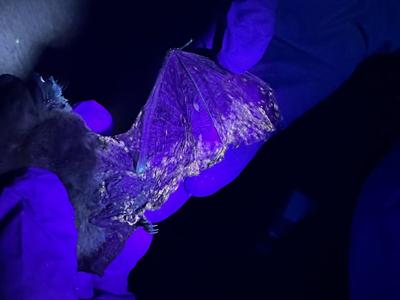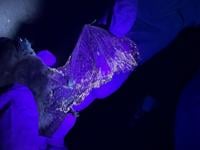A mysterious disease affecting bats has recently been discovered in Colorado, and it could have a significant impact on the state’s agriculture economy, according to Colorado Parks and Wildlife.
On Feb. 29, a ‘little brown bat’ was found crawling on a public bike path in Longmont, according to a release from Colorado Parks and Wildlife. A wildlife rehabilitator found a bat in a state of severe dehydration with brittle wings that hindered its ability to fly. Following this discovery, Colorado Parks and Wildlife (CPW) recommended that the rehabber send the bat to the CPW Wildlife Health Lab for additional examination and assessment.
Less than a week later, on March 5, CPW received the bat and gathered biological samples, which were then sent to Colorado State University for analysis. The test results from CSU confirmed the presence of white-nose syndrome (WNS).
Subsequently, another 'little brown bat' was diagnosed with WNS in Boulder two weeks later, suggesting that further bats may have been exposed to the disease.
The recently discovered case mark the second and third instances of WNS found in Colorado. A year ago, the first instance of white-nose syndrome in Colorado was recorded when a Yuma bat was found with the fungus by National Park Service staff at Bent’s Old Fort near La Junta.
“While it is unfortunate to discover this deadly disease in a second Colorado bat species, CPW did anticipate that this would happen based on what has been documented in other states,” Dan Neubaum, CPW Species Conservation Program Manager, said in a statement. “We will continue to monitor the spread of this disease with our partners and ask the public to report sick or dead bats to CPW, particularly when found during winter and spring months.”
According to the U.S. Department of Fish and Wildlife, WNS is a devastating disease affecting hibernating bats, caused by a fungus known as Pseudogymnoascus destructans (Pd). Pd grows in cold, dark, and damp environments, attacking bats' bare skin while they hibernate, causing them to become more active than usual and deplete their fat reserves needed for winter survival. The disease also causes unusual behavior in bats, such as flying outdoors in the winter during the daytime.
First identified in 2007 near Albany, New York, WNS has rapidly spread across North America, with millions of bats dying — some species experiencing mortality rates as high as 90 to 100 percent. The fungus that causes WNS has been found on bats in Europe and Asia, where the impact is less severe, but the origins of Pd remain unknown.
Colorado Parks and Wildlife said the potential effects of this disease on the state’s bat populations could be devastating. According to CPW, of the 19 bat species native to Colorado, at least 13 may be susceptible to this disease. CPW estimates that bat’s predation on insects contribute $3 billion annually to the U.S. agricultural economy through pest control.
While the transmission from bat to bat is has been deemed impossible to mitigate, CPW and other agencies are encouraging those who enjoy the outdoors to take steps to prevent the further impact of WNS.
CPW says the fungus does not infect humans or pets. However, the fungus can be transported on gear and clothing that has been in contact with contaminated environments, such as caves where bats hibernate.
Adventurers are encouraged to decontaminate gear before and after visiting or touring caves. They are also encouraged to inspect gear and equipment before leaving sites to avoid the accidental transport of bats.
The U.S. Department of Fish and Wildlife has published a full guide on decontamination for viewing.
“We continue to ask those visiting caves to decontaminate their gear to prevent human spread of the fungus and remind the public not to handle bats when encountered but instead report them to CPW, wildlife rehabbers, or the Colorado Department of Public Health and Environment,” Neubaum said in a news release.
CPW warns outdoor enthusiasts not to touch bats. Report dead or sick ones to CPW by sending notification to e-mail: wildlife.batline@state.co.us.






 Your Privacy Choices
Your Privacy Choices